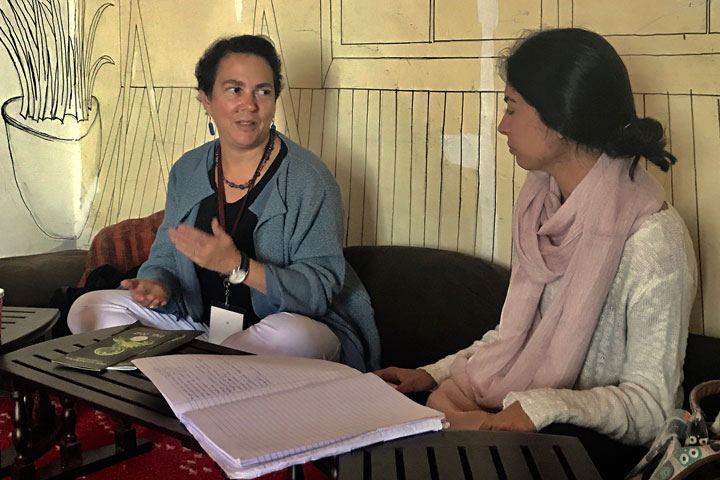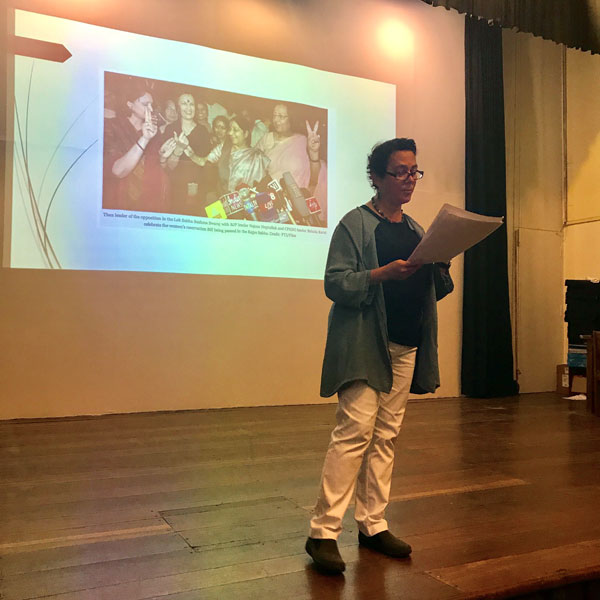
13 Sep Cultivating Compassion – An interview with Wendy Singer
CFI Intern and Grade 11 student, Nandini Seth interviews Wendy Singer, a modern Indian history scholar visiting from Kenyon College.
It’s strange how life offers us so much: endless possibilities, thousands of topics to explore, books, blogs, writers, people…this realisation was what my discussion with Wendy Singer taught me, how life is a journey with many beautiful, interesting experiences on the way. All we have to do is take chances to get to them.
Wendy Singer visited the Centre for Imagination this week. A professor at Kenyon College, a political expert on Southern Asia, and an author of multiple books and much more, she is truly an inspiration for us all. Her work has taken her all over India. She has many different interests and has spent her life exploring each one. It was a lovely experience to talk to someone with so many passions and stories. She was genuine and friendly. Funny and very, very interesting, she answered all of my strange questions without complaint and even with a smile!
Found in translation
Her professional story seemed to start when she was in college. It’s strange, isn’t it, how a mistake or a chance encounter can change your life. Well, that’s what happened to Wendy Singer when she took Buddhism at the University of Virginia. A random choice, a different choice, that changed her life and made her who she is today. She enjoyed Buddhism and decided to pursue it. Unfortunately for her, the only other Buddhist class that the University of Virginia offered was a Tibetan Buddhist compassion course taught by a German Tibetan Monk who only spoke German and Tibetan. She didn’t know either and should have been removed from the class, but it was a class on compassion, so the professor arranged for Ms Singer to receive translations. A beautiful story, and the class was translated for her with the same compassion that it was teaching.
One day, however, she asked the professor “What do Tibetan Monks do to cultivate compassion?” and the German Tibetan monk replied, “When you have compassion, you will find the answer”. That’s when Wendy Singer realised that her interest was not in becoming Buddhist, but in studying Buddhism, so she took an Indian History course and her career took off from there.
A recipe for learning
This career of different ideas, studies, and interests has taken her everywhere and given her lovely experiences from meeting the Dalai Lama, and feeling his spiritual presence change the air in the room while they talked about Lalu Prasad Yadhav, to traveling all over villages in Bihar, talking to people about the peasant movements of the 1930s.
 While she was doing the latter, Dr. Singer realised that she had not interviewed any women. A strange realisation and so she decided to do the only thing she could do in that situation, interview women. She soon realised that was a lot easier said than done. It was hard to find women to interview and talk to in villages but again a chance encounter paid off. One evening, Dr. Singer was walking on a path in a small Bihari village, when she saw a woman hanging up clothes outside her house. This is how Dr. Singer tells the story:
While she was doing the latter, Dr. Singer realised that she had not interviewed any women. A strange realisation and so she decided to do the only thing she could do in that situation, interview women. She soon realised that was a lot easier said than done. It was hard to find women to interview and talk to in villages but again a chance encounter paid off. One evening, Dr. Singer was walking on a path in a small Bihari village, when she saw a woman hanging up clothes outside her house. This is how Dr. Singer tells the story:
“So, one day I was walking through a village and there was a woman hanging up clothes, I think, and I just walked up to her randomly and started talking. She asked me who I was and I went through the whole thing about how I was doing a PhD. None of this seemed important to her. What was important to her was if my parents knew I was doing this. And I said yes, and that I was living with a family. I said, “In fact, I have to get home before dusk because they would get worried.” And then she said, “Are you married?” and I said no. She asked me if I could cook and I said no. She said, “How will you get married if you can’t cook?” so she took it upon herself to teach me how to cook. So every day, for a while, I would go to her house. I would go and she would teach me how to cook, and the first thing she taught me was how to make purees. We would sit in the kitchen and, while she would teach me, she would tell me stories and sing songs about what she did in the 1930s. I still have that in my note book: one side with recipes and stories, songs she used to teach me, and the other with my notes and that was the beginning of how I learned to cook. I did learn how to cook and, secondly, I realised what kind of politics women were doing in the 1930s.
Things like this – weird coincidences, strange chances, talks – can change your life and that’s the beauty of life, and according to Wendy Singer that is what we have to do today.
The power of positive discrimination
Our electoral system needs us to do just that. We need women to take up places in parties (India’s government at the moment is made up of only eleven percent women. A tiny fraction compared to the rest of the world because, according to Dr. Singer, women are not put forward to run by parties. Women in India are often part of NGOs instead, because that is their chance to help). To her, women are vastly important and the one institution she feels should go from India to the US is the fact that in India today we have reservations for women and discriminated groups. One third of a panchayat (village governing committee) has to be made up of women. Schools, jobs, and so on now have reservations for people. This has been Wendy Singer’s new interest and her expertise in it is truly beautiful.
To see someone learn just to learn is unfortunately quite uncommon now and Dr. Singer demonstrates this great quality. That’s the way she teaches as well: she finds books on her interests and studies them with her class. Through this, she has read more and taught more than ten different courses. It’s truly remarkable.
Our last question from the Centre for Imagination is always, “What role does imagination play in your life, in your work, and in who you are as a person?” and the answer was beautiful: “ the word imagination means we can’t move forward without first realising where we are going and imagination helps us with that. So I like to take really long cycle rides. Here’s the material I have before me. How can I look at it differently? And that’s what i think imagination does, it helps you look at something in a new way, a way you hadn’t thought of before, rather than continuing along the same path.”
Nandini Seth, CFI Intern and Grade 11 student






No Comments